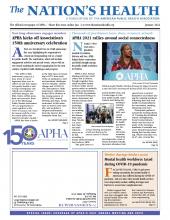At age 17, Germán Paradi was attacked and shot in the neck, with injuries that led to quadriplegia. As a young adult, he advocated for people with disabilities, and in 2019 he won the Speak Up for Better Health award, given by the Center for Consumer Engagement in Health Innovation.
“People with disabilities across the ages need to be recognized as experiencing social isolation,” Paradi said during APHA’s 2021 Annual Meeting and Expo in October. “It is a matter of life and death to have a social connection.”
A summer 2020 survey from the Centers of Disease Control and Prevention, administered a few months after distancing recommendations were put in place because of the COVID-19 pandemic, found 36% of people reported feeling lonely “frequently” or “almost all the time.” And 61% of young adults ages 18 to 25 reported extreme levels of loneliness. The pandemic has increased isolation, as more people worked from home, students took remote college classes and people avoided social gatherings because of health risks.
That increase is a concern to health professionals, as social isolation has been associated with negatively impacting general health and contributing to premature mortality. It may also have an effect on immune response and increase risk of COVID-19 infection, according to Edward Garcia, MHS, founder and executive director of the Foundation for Social Connection.
Humans are social beings, and positive connections with others increase well-being and quality of life, according to Kim Van Orden, PhD, a psychologist and healthy aging researcher at the University of Rochester Medical Center.
Van Orden’s work mostly involves social isolation among older adults. She said programs that support volunteering, group projects and peer companionship show promise for engaging seniors.
But though behavior interventions can reduce loneliness and social isolation, “the bad news is we lack replication, clarity on mechanism, as many studies do not enroll people who are lonely or isolated,” Van Orden said.
Another problem is that people with disabilities are often not part of the conversation on mental health or social isolation, Paradi, co-executive director of the Partnership for Inclusive Disaster Strategies, said. Still, during the pandemic, he saw the positive impacts of telehealth sessions and online social networks on people with disabilities, offering hope.
“We need a standardized measurement in isolation and loneliness, and a national strategy that supports (mental health) in communities and states,” Garcia said.
For more information on strategies for people with special needs during disasters, visit https://disasterstrategies.org.
A version of this story was published on APHA’s Annual Meeting Blog.
- Copyright The Nation’s Health, American Public Health Association









